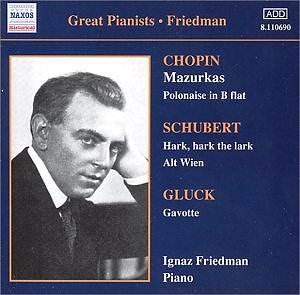There are some old friends of mine here Ė principally
the Chopin Ė from an Opal double-LP album. Opal, as Pearlís historical
records were then called, believed in "straight" transfers
with no noise reduction. Ward Marston, who is responsible for the Naxos
series, has no truck with Cedar processing or the like, but he evidently
believes that surface hiss can be reduced to less obtrusive levels without
undue impairment of the sound. There is certainly a lot less surface
here and the piano sound is mellower, which might be considered a synonym
for "muffled". I wouldnít make much of this since I was too
engrossed in the performances to worry until I came to the end and made
a few comparisons. I do however find just that little more presence
in the Opal sound (though I do not know if those transfers are available
on CD, and with what results).
Until Rubinstein recorded his first set of the complete
Mazurkas in 1939-40, Friedmanís four 78s, all present here, were the
most comprehensive selection from a single artist. The Rubinstein set
is already available on Naxos and has been reviewed by me, as have been
notable sets by Nina Milkina and Joyce Hatto. If you hop back and forth
between Friedman and any one of these three, you will probably get a
heart attack and will certainly miss the point of what Friedman is doing.
It is true that, looked at coldly with a score in front of one, he can
seem pretty much a law unto himself. Dynamics are upgraded and downgraded
at will, bass notes are thickened. He can sometimes surge forward so
impetuously that itís difficult to be sure if he has played all the
notes. He inserts expressive commas here and there and the mazurkasí
rhythms can sometimes lead to such a separation between the second and
third beat that every bar seems to have a hiccough in the middle of
it. But then close your eyes and just listen to how the music speaks,
how one moment it dances gracefully, how the next it evokes peasant
instruments, and how it then speaks of infinite melancholy. The sounds
and sensations of Chopinís loving evocations of his homeland are uniquely
realised. Note, too, how he takes a little-known Polonaise (not included
by Rubinstein in his "complete" Polonaise recordings) and
makes it blossom into a thing of real beauty. A little voice inside
me says it ought to be possible to realise them while remaining close
to the letter of the score, but the fact is that no-one has done so.
Basically, I am in favour of a "purist", non-interventionist
style of musical interpretation, but there are a few artists whose sheer
creativity makes me wonder if I havenít been getting it wrong all these
years, and Friedman is chief among them.
Though the Chopin is the thing here the four arrangements
which open the disc are well worth having, full of elegance, charm and
some wonderful examples of Friedmanís light and even fingerwork. With
an informative note by Jonathan Summers this is an essential item in
any Chopin collection, and it is completed by the opening of a broadcast
talk Friedman gave in New Zealand, cut off, alas, just as he is getting
into his stride.
Christopher Howell

